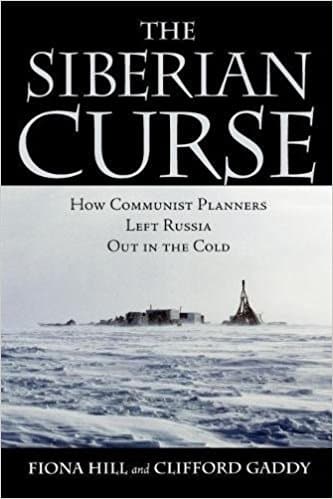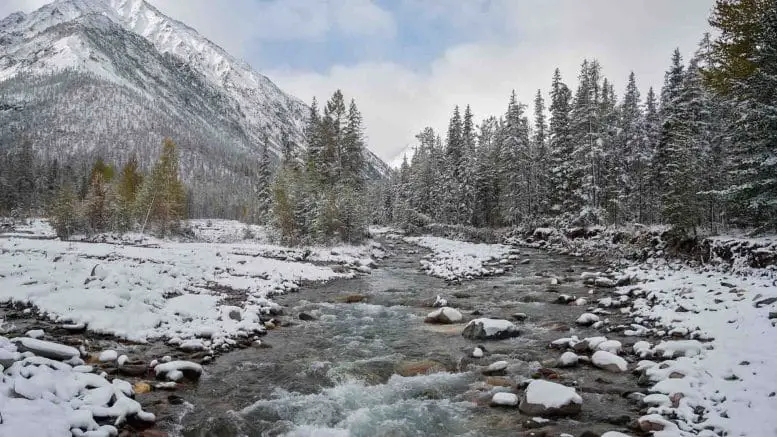
Russia has been given a set of starting values different from most. For starters, the country gets colder as you go east, rather than north, so that the Russian east coast is as frigid as the US west coast is temperate. Furthermore, in an ironic twist of geography, the majority of Russia’s natural resources are located in the eastern-most provinces still often referred to collectively as “Siberia” by non-Russians. This is Siberia’s “curse.”
Russia is dependent on these resources for not only maintaining its internal economy, but also for its current place in world politics and trade: as an “energy superpower.” However, the resources are difficult and expensive to extract. The underdeveloped infrastructure of Siberia is further hindered by the months it spends under snow, when many cities are accessible only by air, the labor force is home bound and freight transportation is nearly impossible. Furthermore, the cold places these cities in constant physical danger. If heating fuel or electricity becomes unavailable, emergency supplies must be flown to them. Buildings must be de-iced and Russian fighter jets bomb rivers to clear them of ice dams. Hill estimates that some 2% of Russian GDP is spent on keeping the critically important east functioning during the winter.
If Russia had developed under capitalism, Siberia may never have been developed. While its resources are vast, the cost to maintain an investment there is also vast. While extraction industries can offer high wages, it would be difficult to convince people to freely migrate in mass numbers to such an inhospitable, deadly clime. However, Russia didn’t develop under capitalism, and the central planners of the Soviet government chose to construct Communism in the permafrost. With wagon loads of labor from the GULAGs, giant factories were built, mines dug, oil wells drilled, and towns founded across the tundra.
Today, Hill estimates, Siberia is overpopulated by several million more than the area can support. Yet movement back out of Siberia is slow, in part because extraction is still labor-intensive and the workers still needed. Also, Russia’s labor market and information systems are underdeveloped. Siberians don’t leave because they don’t know where better jobs are. One solution is to employ less labor-intensive methods and retrain those workers. This capital investment would have to be supplemented by increased investment in new wells, as Russia’s currently tapped deposits are set to run dry within the decade. But, again, this requires capital investment, and, as it costs twice the amount for Russia to produce oil as its competitor Saudi Arabia, the market may be too volatile to invite such large-scale investment without government intervention.
There are problems with providing such intervention, however. Hill met with President Putin at his dacha recently. Putin, Hill stated, would prefer to see Russian capitalists take care of their own investing. Besides, their capital came nearly free anyway, and they can afford to make a gamble for the gift-horse. Furthermore, although the government currently has millions coming in from fuel sales, and billions in cash reserves, it has many more fish to fry than will fit in a pan even as big as the Siberian reserves. The army and police force needs to be refurbished and reorganized, infrastructure built and repaired, national security bolstered, welfare and veterans benefits funded, etc, etc. Russia has a lot of money, much more than most modern states, but it is facing substantially more costs than most, all related to converting the economy and society into a modern capitalist one.
Hill also discussed taxation with Putin and others. Increased tax revenues would improve the situation and open more possibilities for Siberian investment. New revenues are probable, as Russia is a country ripe for continued investment from foreign and internal sources alike, and new investment generally results in new taxes. Also, that existing corporations must be made to pay their legal share is, at least officially, at the heart of the current Yukos debacle. But what were interestingly left out were plans to harvest taxes by bringing more of Russia’s still-massive shadow economy under legal auspices. With true Russian historical irony, however, leaving the anarchy of the shadow economy may be a sign that Russian democracy is growing healthily.
How can this be? Russia’s shadow economy is estimated to be about half of what its official counterpart is. It’s enormous, and rampant. Pirated software and media can be bought openly on the street, and it’s no secret that many, many Russians receive “black” paychecks: under-the-table payments and benefits that the government never hears of. So there is a crack-down now on corporate responsibility, but apparently only for “big business.” Middle and lower-class workers and shop owners are currently out of the government’s scope.
Historically, governments levied more tax on the “common” people so as to keep the favor of the wealthy and thus stay in power. Modern democracies, however, are marked with a different structure with heavier taxation of corporations and the wealthy so as to ease the burden on the consumer base that is also the voter base. Most of these consumer-voters in Russia still spend 100% of their salaries to maintain their near-western lifestyles. Since they have no savings to fall back on, new taxes here would lead to instability within the class itself, and would, of course, lead to their political disfavor.
So what does all this mean? Without increased Siberian investment, Russia stands to lose its place in world politics and even risks sending its current economy into the doldrums. A crack down on the shadow economy would be certainly as lucrative, if not more, as a crack down on corporations such as Yukos. However, this shadow economy is keeping Russia’s consumer-voter base growing and (at least passively) supportive of the government. Allowing the shadow economy (for the time being) shows that Putin and the government is taking Russian’s nascent democratic institutions seriously and that growing a modern, active consumer base, and courting their political favor, is a priority. It’s at least as important as maintaining oil output in critical Siberia. So what is to be done in Siberia? For now, nobody knows. But the government may have found a unique path of growing its new democracy from a partially anarchical economy.
The preceding article originally appeared in edited form in AmCham News, Issue 11, Number 61, pp. 44, under the title “Too Rich for Its Own Good.” It was written by SRAS graduate Josh Wilson and appears here with the permission of AmCham News in unedited format. AmCham News is the official publication of The American Chamber of Commerce in Russia.
Buy: Siberian Curse: How Communist Planners Left Russia Out in the Cold



